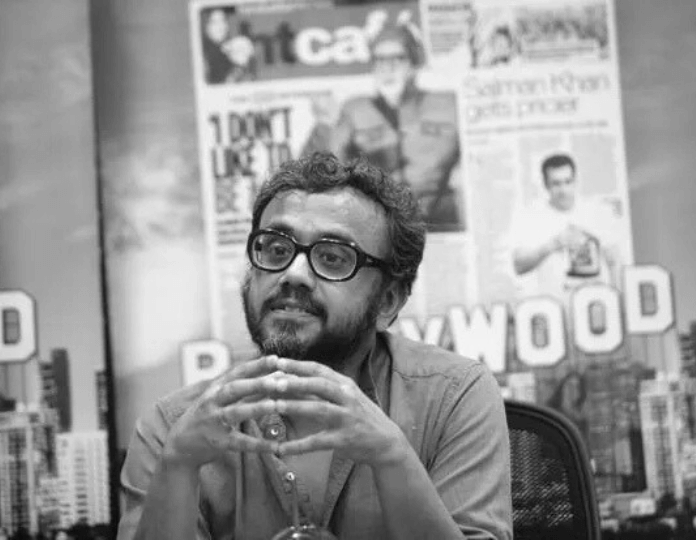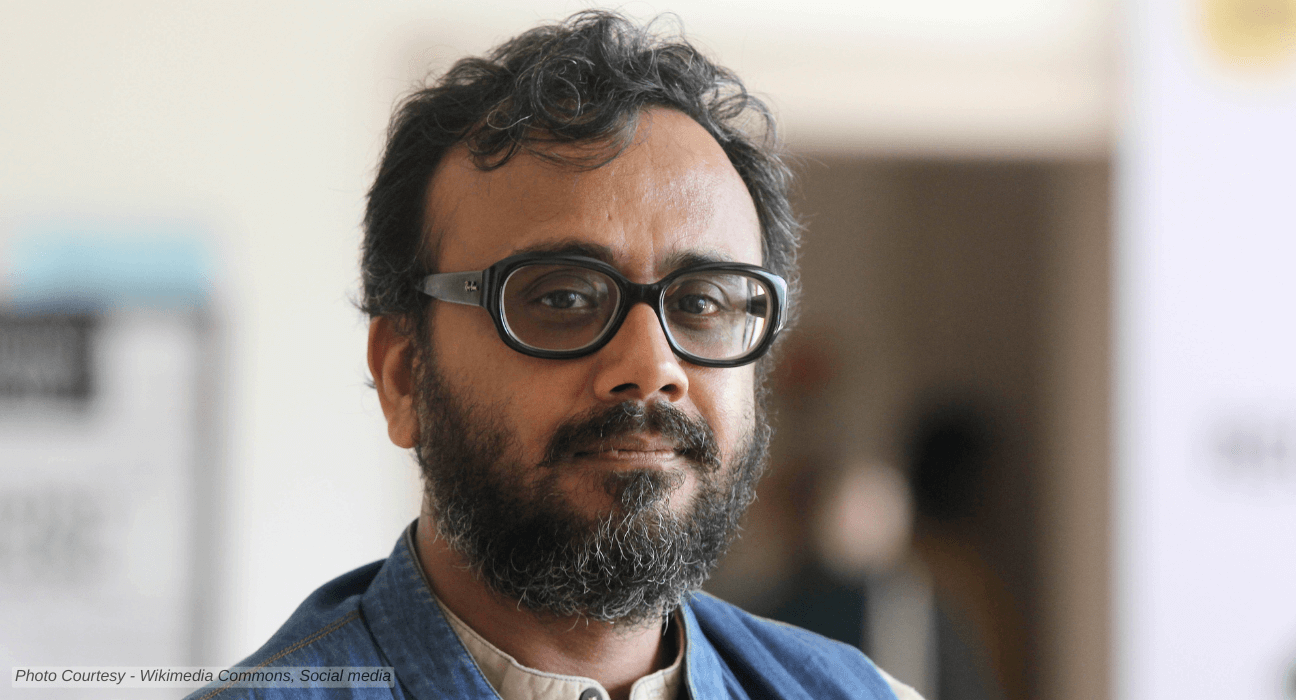Dibakar Banerjee is one of the new-age film makers who is responsible for changing the language and tone of cinema in the 2000s. His films like Khosla Ka Ghosla (2006), Oye Lucky! Lucky Oye! (2008), Love Sex Aur Dhokha (2010), Shanghai (2012), Bombay Talkies (2013), and Detective Byomkesh Bakshy (2015) are proof of his diverse work portfolio.
Early Life and Career
Dibakar Banerjee was born on June 21, 1969, in New Delhi, India. Banerjee’s early life in West Delhi’s Karol Bagh area laid the foundation for his deep understanding of the urban milieu, which later became a hallmark of his films. He attended Bal Bharati Public School, Delhi, and later pursued a course in visual communications and graphic design at the National Institute of Design, Ahmedabad. However, his quest for a more hands-on approach to storytelling led him to drop out and return to New Delhi, where he began his career in earnest.

Before making a splash in the film industry, Banerjee worked for many years in the world of advertising. He worked as a copywriter with several agencies, including Shems Combit and TBWA Anthem, and later joined Contract Advertising in Delhi. It was here that he collaborated with Pradeep Sarkar and Jaideep Sahni, relationships that would prove instrumental in his filmmaking career.
In 1997, Banerjee took the entrepreneurial leap and founded “Watermark,” with two ex-NID friends. The company focused on developing promos and ad films producing ad films for Channel V and MTV.
Breakthrough of Dibakar Banerjee
His debut film, “Khosla Ka Ghosla” (2006), was a critical and commercial success. It is a delightful comedy-drama that revolves around a middle-class man’s struggle to reclaim his land from a thuggish property dealer. The comedy-drama follows a middle-class Delhi family, led by Kamal Kishore Khosla (Anupam Kher), as they battle a crooked property dealer (Boman Irani). The cast includes Ranvir Shorey, Navin Nischol and Tara Sharma. Co-written with Jaideep Sahni, the film highlights urban land scams with a dry humor and sarcasam. The film’s heartwarming narrative and relatable characters earned it the National Film Award for Best Feature Film in Hindi.
This film, along with Oye Lucky! Lucky Oye! (2008), a film that explores the life of a charming thief in Delhi. It showcased Banerjee’s unique ability to weave stories around the heart of Delhi, a stark contrast to the Mumbai-centric narratives prevalent in Hindi cinema. The movie’s critical acclaim further established Banerjee’s reputation as a director who portrays the vibrancy and complexities of urban India with finesse.
The film the life of a charming thief, Lucky (Abhay Deol). Based on real-life criminal Devinder Singh alias Bunty, the film blends comedy and drama. The film written by Banerjee with Urmi Juvekar, also stars Paresh Rawal, Neetu Chandra and Richa Chaddha.



Critical Acclaim
In 2010, Banerjee broke new ground with “LSD: Love, Sex Aur Dhokha,” an anthology drama that was shot entirely on digital cameras. Banerjee experimented with the found footage and mockumentary style, using it as a tool to present a raw and unfiltered look at the issue at hand. This innovative approach allowed him to create a sense of realism and urgency that is rarely seen in Indian cinema. The film’s raw portrayal of modern relationships and voyeurism in the age of technology garnered both critical and commercial success.
Shanghai (2012), a political thriller, marked a departure from Banerjee’s previous works. The film’s gritty examination of politics and power in a developing India resonated with audiences and critics alike, showcasing Banerjee’s versatility as a filmmaker. The film was inspired by Vassilis Vassilikos’ novel Z. In the film Emraan Hashmi plays a videographer uncovering a conspiracy, with Abhay Deol and Prosenjit Chatterjee in key roles. Banerjee adapted it with Urmi Juvekar, critiquing urban development. The film competed at Cannes’ Un Certain Regard section.
Banerjee adapts Sharadindu Bandyopadhyay’s legendary detective Byomkesh Bakshy in Detective Byomkesh Bakshy! (2015). Sushant Singh Rajput stars as the 1940s Kolkata sleuth, solving a chemical plot. Film also have Anand Tiwari, Neeraj Kabi, Divya Menon, and Swastika Mukherjee. Banerjee co-wrote it with Urmi Juvekar, produced by Yash Raj Films.



Other Work
Sandeep Aur Pinky Faraar (2021) is a crime drama that delves into the lives of two individuals on the run. With this film, Banerjee once again demonstrated his skill in crafting compelling narratives that reflect societal issues. It follows a banker (Parineeti Chopra) and cop (Arjun Kapoor) on the run. Banerjee wrote and directed, delaying the project due to funding issues. Its exploration of gender roles and corporate crime adds to Banerjee’s thematic consistency, though it received mixed feedback.
Banerjee also directed segments of anthology films Bombay Talkies (2013), Lust Stories (2018), and Ghost Stories (2020). He also produced Kanu Behl directed Titli (2015), a neo-noir crime drama starring Shashank Arora, Shivani Raghuvanshi, Ranvir Shorey, and Amit Sial.
More recently he directed the sequel to LSD, Love Sex Aur Dhokha 2. Unlike the first film, it gets mixed reviews and was not very successful at the box office.
Dibakar Banerjee’s Craft
Human psychology, crime, and morality are the recurring themes in almost all of Banerjee’s work. He delves into the psychological aspects of his characters, bringing out their inner conflicts and moral dilemmas. This is evident in “Love Sex Aur Dhokha,” where he explores themes of love, betrayal, and voyeurism, challenging the audience’s perceptions and pushing them to reflect on their own moral standings. In “Shanghai,” Banerjee navigates the murky waters of politics and crime, questioning the very fabric of morality in the face of power and greed. The film’s dark and gritty narrative forces viewers to confront the harsh realities of political corruption and its impact on the common people.
Banerjee’s contribution to the anthology “Bombay Talkies” (2013), made to celebrate 100 years of Indian cinema, and his segment in “Lust Stories” (2018) further exhibit his range and commitment to storytelling.
Banerjee is married to Richa Puranesh. The couple lived in Delhi for many years before moving to Mumbai. They reside in Mumbai with their two daughters.
Personal Life
Sulabha married theatre actor-director Arvind Deshpande in the early 1960s. They had a son, whose details remain private. Arvind passed away in 1987, leaving Sulabha to continue their theatre legacy. Her daughter-in-law, Aditi Deshpande, is also an actress. She passed away on June 4, 2016, in Mumbai at age 79 after a prolonged illness. Her cremation took place the next day, attended by figures like Nana Patekar, Ratna Pathak Shah, and Govind Nihalani.
Dibakar Banerjee on IMDB














Leave feedback about this